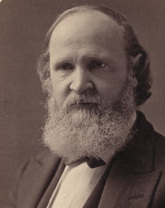 loading
loading
Old YaleAdvice for the language-lorn Manuscripts & ArchivesWilliam Dwight Whitney, a nineteenth-century Yale professor and editor of the Century Dictionary, received hundreds of letters from people seeking spelling and grammar advice. View full imageDear Sir, — In the sentence, “I saw the children in the garden,” is the phrase, in the garden, adjective or adverbial? Dear Sir: — Will you kindly spare a few minutes of your valuable time to give your opinion as to which is the best encyclopaedia in use at present? Dear Sir: — In forming a word that will designate a follower of Delsarte, should the new word be “Delsartean” or “Delsartian?” The recipient of these queries, and hundreds more, was William Dwight Whitney (1827–94), who served for four decades as the University Professor of Sanskrit and Comparative Philology at Yale. Whitney had been one of the early students at Yale’s Graduate School (then called the Department of Philosophy and the Arts) and became a great teacher of a variety of ancient and modern languages. Nineteenth-century Americans, who wrote to him from all over the country with their questions about language, knew him as the foremost U.S. philologist, an expert grammarian, and the lexicographer who took up Noah Webster’s torch to edit the multi-volume Century Dictionary. Whitney graduated from Williams College in 1845 at the age of 18 and worked for three years at his father’s bank in Northampton, Massachusetts. Influenced by his pastor, George E. Day ’33, and by books his brother had collected in Europe, he began to study Sanskrit. In 1849 he came to Yale to study under Edward E. Salisbury, who was said to be the only trained Orientalist in this country. He spent just four years as a Yale student, three of them in Germany, before Salisbury relinquished the teaching of Sanskrit to him and endowed his professorship. Whitney went on to publish 360 books and articles, including Sanskrit Grammar—still in print—and German and English editions of the Atharva Veda, one of the four principal sacred texts of Hinduism. As a teacher, said Yale president Timothy Dwight, he “had unusual gifts and a singular ability” to help students develop their talents. Whitney also served for three decades on the governing board of Yale’s Sheffield Scientific School, and he became a major force in transforming Yale into a modern and internationally known university. (His siblings shared his extraordinary gifts. Josiah Dwight ’39, the Harvard geologist for whom Mount Whitney is named, headed the 1860s survey of California. James Lyman ’56 and Henry Mitchell ’64 became leaders in the library profession. Maria held the first professorship of modern languages at Smith College.) Whitney published two widely read books—Language and the Study of Language (1867) and The Life and Growth of Language (1875)—on the origin and development of language. His theories on the debate then current over Darwinism and language were at odds with those of an Oxford professor, Max Müller, and the two had a prolonged and often heated dispute. As the historian Stephen G. Alter explains, Charles Darwin “concluded that articulate language and humanity’s unique cognitive abilities had co-evolved, each reinforcing the other in an ascending spiral of development.” Müller disagreed, arguing “that the rudiments of speech had appeared simultaneously with the beginnings of human reason.” Whitney’s own view was that “man was man before the development of speech began; he did not become man through and by means of it.” Newspapers, magazines, and scientific journals followed the sparring between Whitney and Müller. Whitney gained the support of many scientific scholars, including Darwin himself. Whitney’s article “Darwinism and Language,” Darwin wrote him in 1874, “seems to me most clearly reasoned, and by far the best argument against Max Müller’s views which has ever appeared.” Müller, however, gained popular sympathy. Whitney had coedited the 1864 edition of Webster’s dictionary, and he dedicated the last period of his life to serving as editor-in-chief of the Century Dictionary and Cyclopedia. The first edition of this work, 7,046 pages long, was issued during 1889–91 in 24 volumes, illustrated with about 10,000 engravings. In addition, his authorship of grammars and textbooks in English, French, and German had made him the undisputed authority on language usage in America. Teachers, pupils, and the general public wrote to him frequently, asking for advice on usage and grammar and sometimes for his help in settling arguments. In the library’s Manuscripts and Archives division, picturesque engraved letterheads survive from such institutions as the Central Business College in Sedalia, Missouri; the State Agricultural College in Corvallis, Oregon; and the American Brake Company in St. Louis. A letter from San Francisco asks for guidance in the use of the “new words” typewriter, Typewritor, and typewritist. One fan, in Crestview, Florida, paid Whitney an appealing compliment in 1890: “The editor of ‘The Ladies Home Journal’ has invited suggestions for improving that excellent magazine. I have suggested that in the Department of Fashions we have a column or two of ‘Fashions in Spelling.’ I have also taken the liberty of suggesting Prof. Whitney of Yale, as my first choice for Editor.”
The comment period has expired.
|
|